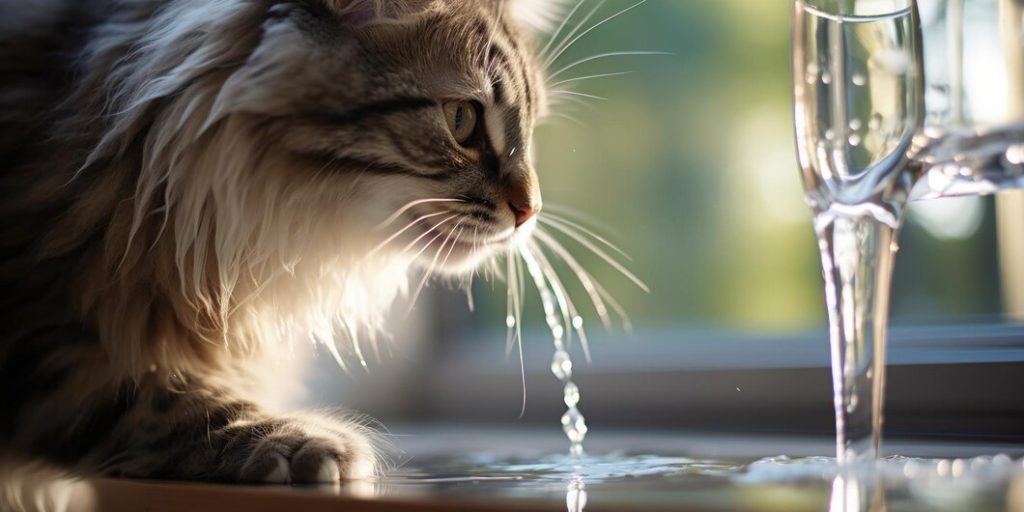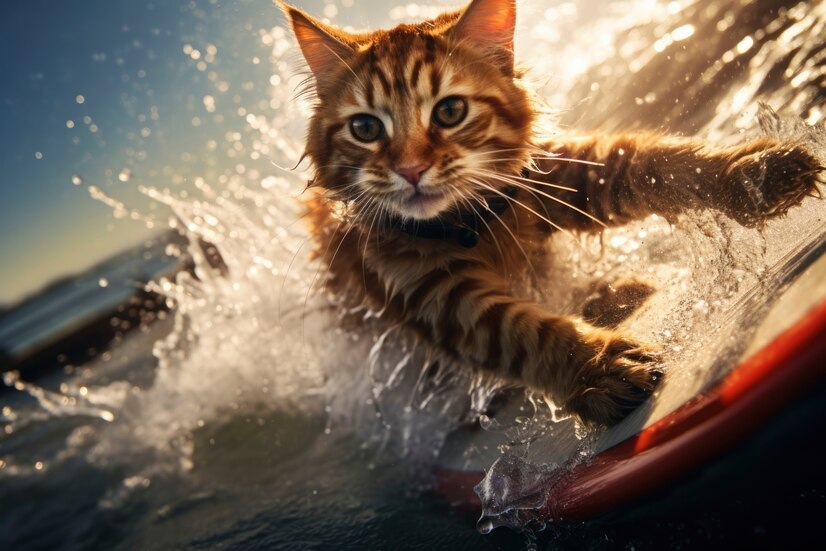If you’ve ever tried to bathe a cat, you may have experienced their aversion to water firsthand. But why do cats hate water so much? This question leads to interesting insights into feline evolution, sensory preferences, and instincts. Cat’s dislike of water isn’t arbitrary—it’s woven into their nature, making it essential for owners to understand and respect this trait.
9 Reasons Why Cats Hate Water
1. An Evolutionary Aversion to Water
After lot of research we have come to know, domestic cats evolved in dry, desert climates where bodies of water were scarce. Unlike dogs, who adapted to various environments and climates alongside humans, cats didn’t naturally develop a need to swim or bathe in water. As a result, cats lack the evolutionary familiarity with water that some other animals have, making them hesitant or outright averse to getting wet. Read more about topic here
2. Discomfort of Wet Fur
One reason behind the phrase “cats hate water” is simply discomfort. When cats’ fur gets wet, it becomes heavy and sticks to their body, making movement difficult. For cats, who rely on agility and stealth, this discomfort can be distressing.
They might also feel vulnerable, as wet fur takes time to dry, which leaves them exposed. This discomfort reinforces their dislike of water, making it something they instinctively avoid.
3. Sensory Sensitivities to Water
Cats are highly sensitive to touch, especially through their fur and whiskers. Water’s sensation on their skin can feel overstimulating, causing sensory discomfort. For many cats, even a few drops of water can trigger a reaction, making bath time challenging. Is water dangerous for cats? Not in itself, but the sensory overload it creates can lead to extreme stress, which they instinctively seek to avoid.
4. Lack of Early Exposure
Unlike dogs, many cats don’t encounter water regularly as kittens. Without early positive exposure, cats are likely to develop a fear or dislike of water, viewing it as foreign and intimidating.
While some kittens may adapt to water when introduced gently, the majority of cats grow up without such interactions, strengthening their aversion. So, when you find yourself wondering, “why cats hate water,” it’s often due to this lack of familiarity.
5. Unpredictability of Moving Water
Cats are creatures of control and routine, and the unpredictable nature of water—especially moving water—can be alarming to them. Running water is often loud, fast-moving, and splashes unpredictably. For a cat, this chaotic element poses a risk.
Even small disruptions in their controlled environment can stress them out, so the moving water that humans find harmless can seem intimidating to them.

6. Strong Smell Sensitivity and Unpleasant Scents in Water
Cats have a finely tuned sense of smell, which is much stronger than ours. Tap water often contains chemicals like chlorine, which can smell unpleasant to cats.
The foreign scents in water only reinforce their natural instinct to avoid it. This aversion can sometimes be less prominent with natural water sources, such as rainwater, but even then, most cats will remain cautious around water they perceive as “unclean.”
7. Negative Past Experiences with Water
Cats are known to remember unpleasant experiences well, and a single bad experience with water—such as an accidental fall or a stressful bath—can lead to a long-term aversion. If your cat had a negative interaction with water early on, they may hold onto that fear. Unlike dogs, who may be more likely to forget and try again, cats’ cautious nature makes them less willing to risk another unpleasant encounter. Read Why Does My Cat Follow Me Everywhere?
8. Self-Grooming Instincts
Cats are meticulous groomers, spending hours each day cleaning their fur. This grooming habit means that, from their perspective, additional cleaning via water is unnecessary. Cats have evolved specialized tongues with barbs that act like tiny brushes, which help them keep clean without water.
Water not only feels uncomfortable but disrupts their natural grooming process, which they rely on to maintain their fur. So, from their point of view, water is not only uncomfortable but also redundant.
9. Water-Loving Breeds: Exceptions to the Rule
While most cats are wary of water, there are exceptions. Breeds like the Turkish Van, Maine Coon, and Bengal are more curious about water and may even enjoy playing with it. For these breeds, the natural inclination to avoid water seems less pronounced. Read Why Does My Cat Follow Me To The Bathroom
The Turkish Van, for example, is often called the “swimming cat,” known for its love of water. This curiosity is generally attributed to specific breed traits and exposure during development, proving that while many cats dislike water, it’s not universal.
Is Water Dangerous for Cats? What You Need to Know
Generally, water isn’t dangerous to cats. However, the stress associated with forced exposure to water can be harmful to their nature. Prolonged or forced water exposure can lead to anxiety and mistrust. For cat owners, understanding this boundary can lead to a better, less stressful approach to their pet’s hygiene.
If bathing becomes necessary, here are some tips to make the experience more tolerable for your cat:
- Use Minimal Water: Opt for a shallow basin with lukewarm water, and keep sessions short.
- Gradual Exposure: Introduce water slowly, perhaps by using a damp cloth first, to ease them into the sensation.
- Reward Calm Behavior: Reinforce calmness with treats and gentle praise to build positive associations.
- Dry Shampoo Alternatives: If your cat’s fur needs cleaning, dry shampoos or grooming wipes made for cats can serve as great water-free options.
Final words
Cats typically dislike water due to their evolutionary background, sensitivity to wet fur, and the discomfort it causes. Cat’s fur can feel heavy when soaked, making them feel vulnerable. They’re also highly sensitive to touch, so water often feels unpleasant and overstimulating. Many cats haven’t been exposed to water from a young age, which heightens their aversion. Combined, these factors create a natural inclination to avoid water.
Read Also



